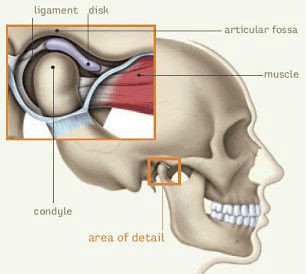TMJ syndrome
TMJ syndrome is broadly classified into 2 syndromes.
The temporo- mandibular joint (TMJ) is the synovial joint that connects the jaw to the skull. These joints are located just in front of each ear.

Classification of TMJ syndrome
TMD is broadly classified into 2 syndromes:
• Muscle-related TMD (myogenous TMD), sometimes called TMD secondary to myofascial pain and dysfunction
• Joint-related TMD, or TMD secondary to true articular disease
Causes of TMJ syndrome
• trauma
• disease,
• wear and tear due to aging
• oral habits, such as chewing gum, tobacco, candy or ice
- grinding your teeth or clenching your jaw
Signs and Symptoms of TMJ syndrome
• Pain in the jaw
• Clicking and popping sound in the ear
• Pain while chewing the food
• Stiff and sore jaw muscles
• headaches
Treatment for TMJ syndrome
? general
- • including heat to the joint,
• nonsteroidal anti-inflammatory drugs (NSAIDs)
• avoiding chewing gum, candy, ice, or tobacco
• stress reduction.- wear a mouth guard at night
- avoid activities that require you to keep your mouth open such as fellatio
- avoid eating food that is hard to chew such as steak
If you are interested in knowing a bit more about this syndrome, check out this link .
? Physical therapy techniques for TMJ syndrome may include:
• Jaw exercises to strengthen muscles and improve flexibility and range of motion.
• Heat therapy to improve blood circulation in the jaw.
• Ice therapy to reduce swelling and relieve pain.
• Massage to relieve overall muscle tension.
• Transcutaneous electrical nerve stimulation (TENS),
• Movement of the temporomandibular (TM) joint to release scar tissue that restricts muscle movement and to improve range of motion.
• Ultrasound therapy- to reduce pain and swelling and improve circulation.
If you have any further queries please call PhysioNow. Our experienced Registered Physiotherapists would be happy to help you recover from TMJ syndrome. There are Registered Physiotherapists at each of our locations that are trained specifically to assess and treat this injury. Assessment takes about 40-50 minutes and each treatment typically takes about 30-40 mins. Resolution of TMJ syndrome can be quite rapid with some patients only requiring a few visits for the pain the stop.